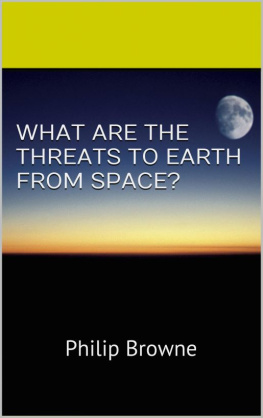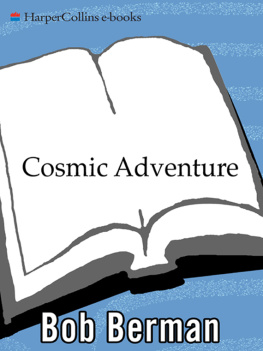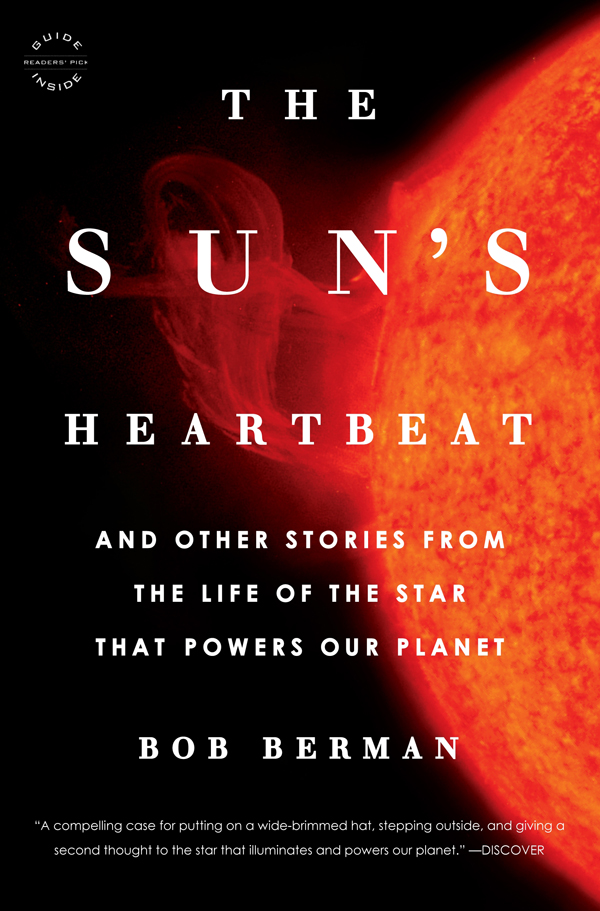In accordance with the U.S. Copyright Act of 1976, the scanning, uploading, and electronic sharing of any part of this book without the permission of the publisher constitute unlawful piracy and theft of the authors intellectual property. If you would like to use material from the book (other than for review purposes), prior written permission must be obtained by contacting the publisher at permissions@hbgusa.com. Thank you for your support of the authors rights.
Copyright 2011 by Bob Berman
Reading group guide copyright 2012 by Bob Berman and Little, Brown and Company
Illustrations by Alan McKnight
Cover design by Keith Hayes; Cover art courtesy of NASA
Cover 2012 Hachette Book Group, Inc.
All rights reserved. In accordance with the U.S. Copyright Act of 1976, the scanning, uploading, and electronic sharing of any part of this book without the permission of the publisher constitute unlawful piracy and theft of the authors intellectual property. If you would like to use material from the book (other than for review purposes), prior written permission must be obtained by contacting the publisher at permissions@hbgusa.com. Thank you for your support of the authors rights.
Little, Brown and Company
Hachette Book Group
237 Park Avenue, New York, NY 10017
littlebrown.com
twitter.com/littlebrown
First e-book edition: July 2011
The publisher is not responsible for websites (or their content) that are not owned by the publisher.
The Hachette Speakers Bureau provides a wide range of authors for speaking events. To find out more, go to hachettespeakersbureau.com or call (866) 376-6591.
ISBN 978-0-316-17539-5
Praise for Bob Bermans
The Suns Heartbeat
A deeply enjoyable book. Berman comes across as the worlds most enthusiastic science teacher, writing infectiously about how humans went from the geocentric days of Aristotle to the current heliocentric understanding. Its hard not to enjoy.
Mark Berman, Washington Post
The Suns Heartbeat offers a compelling and surprisingly playful history of the Milky Ways most famous starfrom the alternately brilliant and misguided theories of the ancient Greeks, to the modern-day discoveries that would make Arthur C. Clarke and Stanley Kubrick blush.
Jacob Sugarman, Salon
Bermans pitch-perfect book goes a long way to answering the questions you thought were too dumb to ask, but it does much more than simply provide facts. Berman is a master storyteller, whose passion and enthusiasm for astronomy has served the public well for decades. Read this and you will never look at the Sun in the same way again.
Michael Brooks, New Scientist
This might be the last book you ever readafterward, you cant help but stare, in wonder, directly into that fiery ball in the sky. From ancient Sun worship to the latest in Sol science, Bob Berman makes The Suns Heartbeat.
Sam Kean, author of The Disappearing Spoon
A quick, smart, and colorful biography of yon flaming orb.
Kirkus Reviews
Berman directs your attention to our neighborhood ball of nuclear fire, telling its story with charm and wit. He makes a compelling case for putting on a wide-brimmed hat, stepping outside, and giving a second thought to the star that illuminates and powers our planet.
Shannon Palus, Discover
An informative look at the life and death of the star on which our lives depend. The authors enthusiasm for science shines through.
John Gribbin, Wall Street Journal
The SunBob Berman always capitalizes the name of his belovedis the most awesome thing around, he exults. After reading this entertaining popular-science page-turner, its tough to disagree. Many of the concepts in this book are mind-bending, but Berman repeatedly employs humor to bring the star-struck reader back to earth.
Duncan McMonagle, Winnipeg Free Press
Bob Bermans lively new book offers a number of fresh perspectiveson the everyday miracle of sight, on the importance of spending time in the Sun, on the reality of global climate change. Berman comes to the rescue of parents (and grandparents) of hyper-inquisitive youngsters everywhere.
Roberta Conlan, AARP
From Coronal Mass Ejections to eclipses to sunspots to sun burns, Bob Berman writes of all things solar with inescapably contagious delight. The Suns Heartbeat reminds us that the star we take for granted, the star that we accept with little thought, is both central to our lives and wonderfully complex. Bermans book, fun and informative, shows us how to see our flaming orb in a new light.
Bill Streever, author of Cold
Bob Bermans The Suns Heartbeat glitters and skips with the joy and excitement of science at its best. He explains things I always wondered about without diminishing the star-gazers sense of awe.
Mark Kurlansky, author of Saltand Cod
Berman extols the Suns aesthetic effectsmost spectacular of them, the total solar eclipse, rivaled, perhaps, by the northern lights, with rainbows as second bananas. An engaging consciousness-raiser that entertains as it informs about our neighborhood nuclear furnace.
Gilbert Taylor, Booklist
Berman shakes readers out of a complacent understanding of his subject with startling facts conveyed in companionably witty prose. Making this common sight mysterious again, he reminds us of questions we had forgotten to ask.
Margaret Quamme, Columbus Dispatch
Bob Bermans look at our skys most important star is as dazzling as the Sun itself. The man can write! He is one of those rare authors whose prose is as delightful to read as it is pleasing to learn from. Having read this book, I will never be able to regard the Sunnor the future beneath itin quite the same way.
James M. Tabor, author of Blind Descent:
The Quest to Discover the Deepest Place on Earth
We wont take the Sun for granted any longer if astronomy popularizer Berman has anything to say about it. Everything about the Sun is either amazing or useful, Berman writes, and then proves it, without a doubt.
Publishers Weekly
Biocentrism
(with Robert Lanza, MD)
Shooting for the Moon
Strange Universe
Cosmic Adventure
Secrets of the Night Sky
To Marcy
Every fifteen years or so, a bright incoming comet intrigues the media, and the juicy topic danger from space gets a brief resurrection. But peril from the sky is never very far from our collective mind-set. The paranoid among us, not content to worry about cholesterol, wonder whether we will soon get clobbered by a giant meteor. Its not completely far-fetched, since a dinosaur-ending impact did indeed change Earth and a dramatic comet explosion over Siberia in 1908 did radically reduce that regions already low property values. Nonetheless, only one astronomical body truly rules Earth and always has. Its the nearest starthe one bearing the second-shortest name of any celestial object.
Most people probably think they know the Sun well enough. Its bright; its hot; it can bestow a handsome tan or a painful burn. What else do we need to know? Reacting with our deep skin tissue, sunlight produces the vitamin D that is the greatest anticancer agent ever discovered. There. Done. Why not leave all other Sun knowledge to geeks and scientists?
But we can scarcely ignore the only outer space object that controls absolutely everything in our neck of the cosmic woods. Especially when it keeps changing unexpectedly, in ways that affect us personally.






